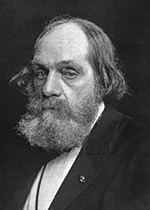Edward Everett Hale
| Full Name: | Edward Everett Hale |
| Born: | April 3, 1822 Roxbury, Massachusetts, USA |
| Died: | June 10, 1909 Boston, Massachusetts, USA |
| Occupation: | Author, Unitarian Preacher, Abolitionist |
| Nationality: | American |
| Links: |
|
Biography
Edward Everett Hale was an American author, historian and Unitarian minister.
Hale was a child prodigy who exhibited extraordinary literary skills. He graduated from Boston Latin School at age 13 and enrolled at Harvard College immediately after. There, he settled in with the literary set, won two Bowdoin prizes and was elected the Class Poet. He graduated second in his class in 1839 and then studied at Harvard Divinity School.
Hale first came to notice as a writer in 1859, when he contributed the short story "My Double and How He Undid Me" to the Atlantic Monthly. He soon published other stories in the same periodical. His best known work was "The Man Without a Country", published in the Atlantic in 1863 and intended to strengthen support for the Union cause in the North. As in some of his other non-romantic tales, he employed a minute realism which led his readers to suppose the narrative a record of fact. These two stories and such others as "The Rag-Man and the Rag-Woman" and "The Skeleton in the Closet", gave him a prominent position among short-story writers of 19th century America. His short story "The Brick Moon", serialized in the Atlantic Monthly, is the first known fictional description of an artificial satellite. It was possibly an influence on the novel The Begum's Fortune by Jules Verne. He was elected a Fellow of the American Academy of Arts and Sciences in 1865.
Works in the WWEnd Database
|
|
|
|
|
|||||||||||||||



















 Full Details
Full Details








